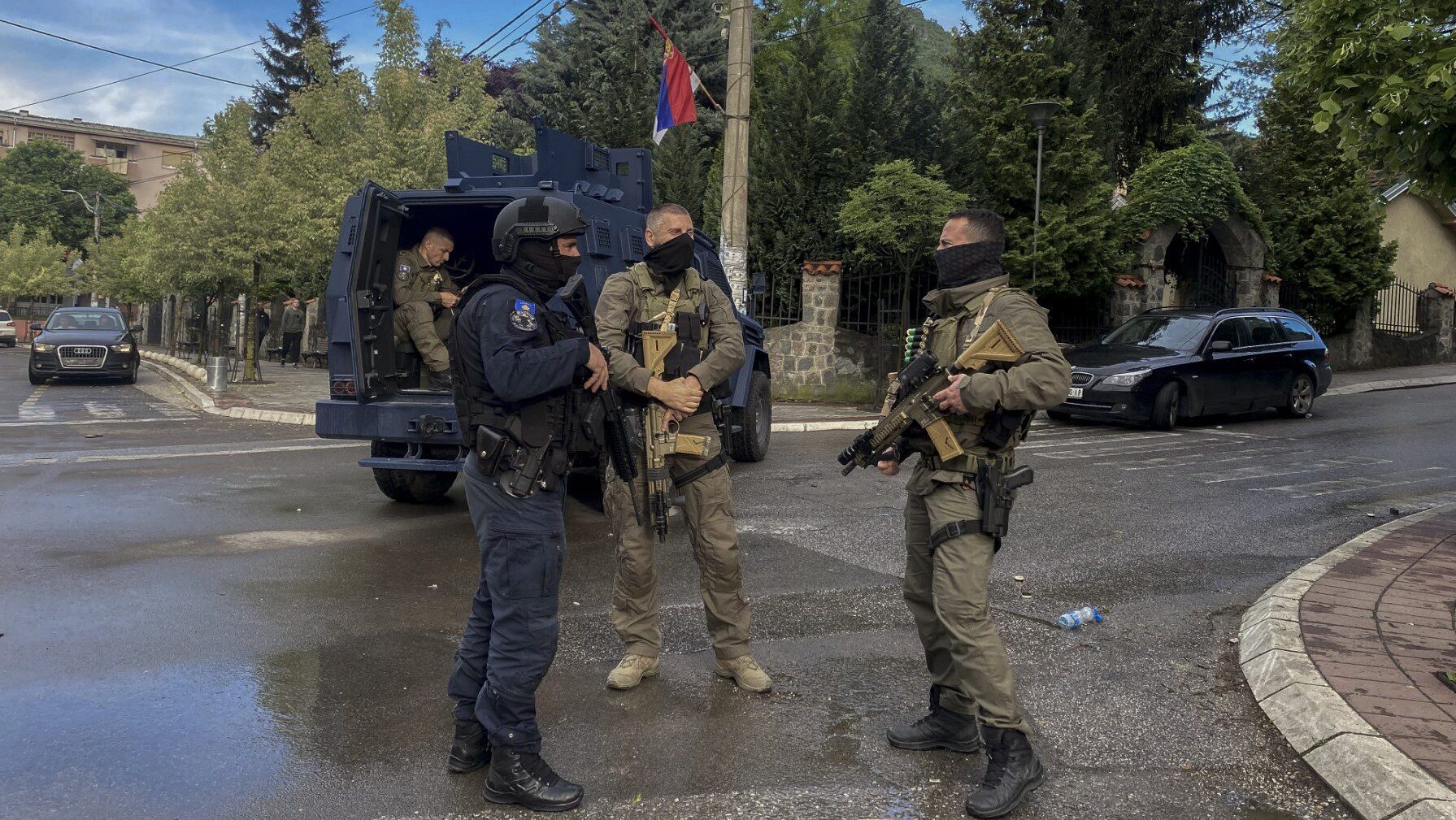
A Kosovan police special unit secures an intersection in the town of Zvecan, following clashes between Kosovo police and ethnic Serb protesters who tried to prevent a newly-elected ethnic Albanian mayor from entering his office, in Zvecan, northern Kosovo, on May 26th, 2023.
Photo: STRINGER / AFP
Serbian authorities put the nation’s army at full combat readiness on Friday, May 26th as it ordered troops to the Kosovar border. The move came after ethnic Serbs living in northern Kosovo had clashed with regional police.
Serbia considers Kosovo to be a breakaway province, and does not recognize its independence.
As Serbia’s commander-in-chief, the order was given by President Aleksandar Vučić.
The Kosovar Serbs, who constitute a majority in the region, had attempted to prevent a newly elected mayor from entering city hall in the town of Zvecan, whereupon Kosovo police intervened, firing tear gas to disperse the crowd. During the scuffle, at least 10 protesters were injured.
Other incidents were reported, during which Kosovo police stormed municipal buildings in Zubin Potok, Zvecan, and Leposavic, firing tear gas, smoke, and stun grenades at ethnic Serb residents who tried to stop them.
Serbia’s Defense Minister Miloš Vučević told Pink TV that the situation in Kosovo-Metohija [the name Serbia designates Kosovo with] was dramatic.
“Someone needs to understand that what [Kosovo’s prime minister] Albin Kurti is doing is leading us to red lines and to a complete collapse of dialogue and an escalation on the ground,” he warned.
The following day, Saturday, May 27th, the Serbian National Security Council announced the army would remain in full combat readiness until further notice following what it terms a “brutal use of force by Albin Kurti and his forces against Serbs in Kosovo-Metohija.” The statement noted that Serbia would be “firm and unwavering in protecting its people.”
Northern Kosovo, while never tranquil, has been on a knife’s edge since local elections were held there last month. These came after Serb administrators had resigned out of dissatisfaction with Kosovo’s policies. Serbian Kosovars, encouraged by Serbian President Aleksandar Vučić, subsequently boycotted these elections, paving the way for the election of ethnic Albanian politicians.
In the meantime, U.S. Secretary of State Antony Blinken issued a response strongly condemning the government in Pristina, the actions of which were escalating tensions in the north and increasing instability. He then called on Prime Minister Albin Kurti to reverse course and “immediately halt these violent measures and refocus on the EU-facilitated Dialogue.”
We strongly condemn the actions by the Government of Kosovo that are escalating tensions in the north and increasing instability. We call on Prime Minister @albinkurti to immediately halt these violent measures and refocus on the EU-facilitated Dialogue.
— Secretary Antony Blinken (@SecBlinken) May 26, 2023
The UK, France, Italy, Germany, and the U.S. issued a joint statement, posted on the British government’s website, calling on Kosovar authorities to “step back and de-escalate” the situation. “We are concerned by Serbia’s decision to raise the level of readiness of its Armed Forces at the border with Kosovo and call all parties for maximum restraint, avoiding inflammatory rhetoric,” the statement added.
The rekindled conflict in Kosovo comes on top of protests against the sitting government and President Aleksandar Vučić after two mass shootings rocked the country in April. After vowing to disarm the country and announcing a month-long amnesty for Serbs to turn in illegal weapons, Vučić has been faced with demonstrations demanding his resignation.
During a party congress on Saturday, President Vučić announced he would be stepping down as leader of the ruling Serbian Progressive Party (SNS). A new approach was needed to unite the country, he said, but added that he would stay on as president, finishing out his term.
